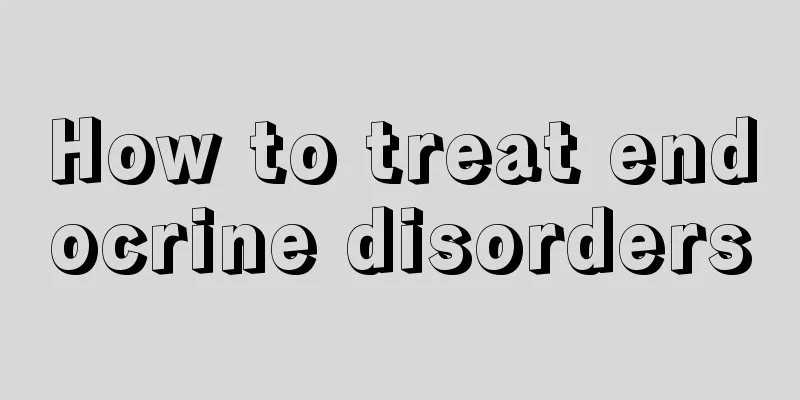How to treat endocrine disorders

|
Endocrine disorders are something that we are all very likely to encounter. People with endocrine disorders usually have many symptoms in their bodies, the most common ones are: acne, getting angry, constipation, etc. Severe cases may even lead to some serious diseases, which are all very likely. So, how to treat endocrine disorders? This is a question that is worthy of people's deep consideration, because it is closely related to our lives. Endocrine disorders are very common in our lives, but people suffering from endocrine disorders are very painful, which is also an important reason why many people are afraid of endocrine disorders. People who suffer from endocrine disorders usually develop them inadvertently, so it is difficult to prevent endocrine disorders. So, in response to this phenomenon, let’s talk about the treatment of endocrine disorders. Most endocrine diseases are accompanied by endocrine dysfunction. The treatment of endocrine diseases is to adjust endocrine function. For hyperfunction, it should be lowered, and for hypofunction, it should be increased and restored to normal. 1. For hyperfunction, one or more of the following methods can be used for treatment. ①Surgical removal of endocrine tumors, or removal of most of the hyperplastic endocrine glands. ② Use radiation or oral isotopes to destroy hyperfunctioning tumors or proliferating glands, such as radiotherapy for pituitary tumors and oral isotope iodine for hyperthyroidism. ③ Use drugs to inhibit hormone synthesis, such as using antithyroid drugs to inhibit the synthesis of thyroid hormones. ④ Use hormones to inhibit the secretion and production of corresponding troponins to achieve the purpose of treating hyperfunction, such as using glucocorticoids to inhibit the pituitary gland from producing adrenocorticotropic hormone to treat congenital adrenal hyperplasia. ⑤ Use drugs to counteract the physiological effects of a certain hormone so that it cannot play its original role. For example, spironolactone can counteract the effect of aldosterone on the kidneys to retain sodium and excrete potassium, and thus can treat aldosteronism. 2. For those with endocrine dysfunction, the principle is to supplement the deficiency. The following methods can be used. ① Supplement the amount required by the human body under normal circumstances, that is, supplement the physiological dose of hormones. For example, thyroid hormone is supplemented for hypothyroidism, hydrocortisone is supplemented for adrenal insufficiency, and insulin is used to treat diabetes mellitus with insulin deficiency. ②Supplement temporary hormone deficiency with super-physiological doses. For example, patients with acute adrenal insufficiency should be given a larger amount of hydrocortisone. For patients with chronic adrenal insufficiency who encounter surgery, trauma, or severe infection, the dose of hydrocortisone should be increased and then reduced to the original dose after recovery. ③Organ transplantation, that is, transplanting other people’s endocrine organs to produce hormones for patients. In recent years, pancreas transplantation or pancreatic islet transplantation has been used to treat diabetes, and pituitary transplantation has been used to treat hypopituitarism. These methods are still in the exploratory research stage and cannot be widely implemented at present. 3. Treatment with traditional Chinese medicine. According to the principle of TCM's syndrome differentiation and treatment, those with hyperfunction should pay more attention to yin-nourishing treatment, while those with hypofunction often show symptoms of qi and blood deficiency, kidney deficiency, etc., and should be given blood-tonifying and qi-tonifying, kidney-tonifying treatments, which can improve their condition. To sum up, there are many treatments for endocrine disorders. The most common ones are drug treatment, surgical treatment, traditional Chinese medicine treatment, etc. These methods are targeted at endocrine disorders in different situations. Therefore, our patients with endocrine disorders must first check the cause of their illness before treatment, and then receive specific symptomatic treatment. This is the most effective way. |
<<: At what age do women's needs end?
>>: What is the disease of hair loss in women
Recommend
Why am I not pregnant yet?
In life, the inability to get pregnant is troubli...
Does anyone know what causes breast pain in girls?
Girl has chest pain. When girls are just beginnin...
90% of diseases are caused by imbalance of internal and external factors
The spokesperson of the Ministry of Health once a...
Can “sleep-aiding foods” really improve sleep?
One third of a person's life is spent sleepin...
Have you heard of congenital cataracts?
“This is a disease that only old people get.” Whe...
What to do if a woman has pain on the left side of her abdomen
Pain on the left side of the abdomen is something...
China's childhood obesity rate remains high, and antibiotics are a major driver
Tuchong Creative According to the "Report on...
What is the reason for hair growing on breasts?
When summer comes, many women go to beauty salons...
Can stretch marks be cured?
Pregnancy is not just about giving birth to a bab...
What happens if you drink saffron during menstruation?
Women's bodies are very weak during menstruat...
What to do if the cesarean section incision becomes suppurated
We all know that the body will become particularl...
Get rid of epilepsy anxiety, a health guide for epilepsy patients from pregnancy preparation to childbirth
Author: Zhao Yanan, The First Affiliated Hospital...
#千万IP创科学普# 2024 World COPD Day Science Popularization: Understand your lung function!
theme On November 20, 2024, the world will usher ...
Does breast hyperplasia hurt during ovulation?
Women have menstruation and ovulation every month...
What does a small amount of cervical fluid mean?
If some pregnant women have problems with their b...









